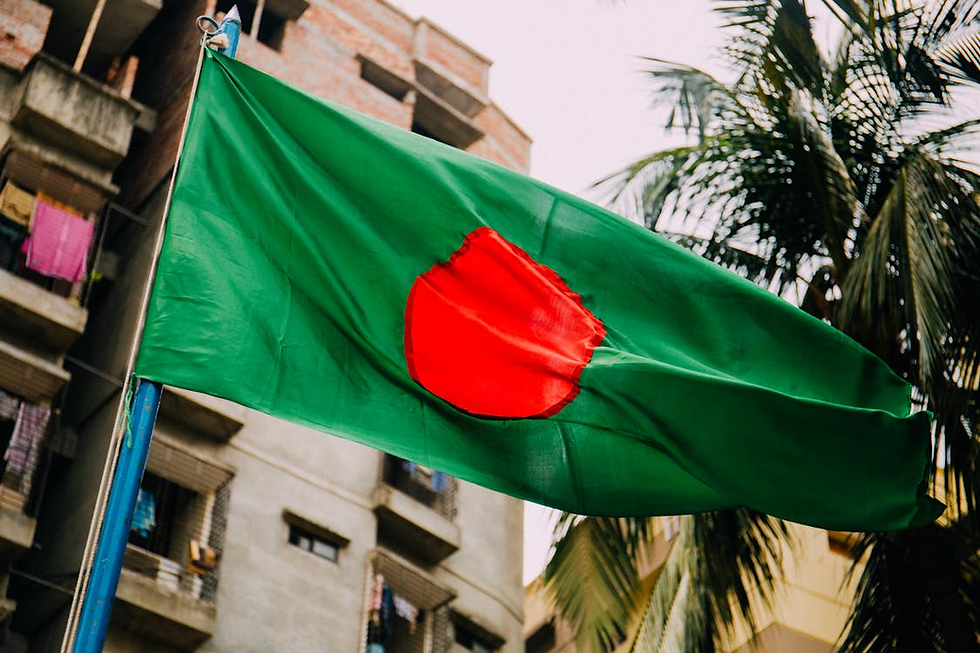The National Security Law Threatening Democracy in Hong Kong
- Tasfia Ahmad

- May 31, 2020
- 4 min read
Updated: Dec 22, 2024
Tasfia Ahmad explains why protestors in Hong Kong are so determined to return to the streets, now that the number of coronavirus cases is decreasing. This article recounts the history of the special administrative region, including its ties with Britain and China, while discussing the threats posed to citizens' freedom. Although the controversial extradition bill was suspended in 2019, the citizens of Hong Kong still feel the need to defend their "One Country, Two Systems" status.
Hong Kong: where East meets the West. The special administrative region is known for its business, trade, and culture, consisting of roots from Britain and China’s culture. There’s a good reason for that. Hong Kong was originally under China’s rule for about 2,000 years until the years of 1842 and 1898, when the British Empire wanted to seize control of regions. China, which was in war with Britain in the First Opium War, ceded some regions of land to end the war. Those plots of land would soon be present-day Hong Kong. On July 1, 1898, the British Empire negotiated the Second Convention of Peking with China, this time leasing the New Territories between Boundary Street and Shenzhen River: the modern dividing line between mainland China and Hong Kong. The lease was to expire in 99 years, meaning that China expected Britain to hand the region back over on July 1, 1997. When that day arrived, the people of Hong Kong were worried that the sudden transfer to China would intervene with their freedom. Therefore, China compromised with a “one country, two systems" structure. Under this arrangement, Hong Kong would follow different rules from the rest of China for 50 years, obtaining freedom in a variety of ways, and thrive in their economy without any disruptions. That was, until recently, when China announced a security law that would change everything.
m
Last week, the National People's Congress in Beijing in mainland China announced a new national security law, which could overturn the two systems framework. This security law would ban treason, secession, sedition, terrorism, and subversion in Hong Kong, alongside any crime that poses a threat to both national and foreign security. However, Hong Kong citizens fear that Beijing will use new institutions not only to ensure security, but to also overthrow Hong Kong's few rights, which include freedom of speech and assembly, alongside the city's independent judiciary. If that happens, it would break the "One Country, Two Systems" policy that officially guarantees Hong Kong's semi-autonomy until 2047. But why is China doing this?
When Hong Kong was handed over to China, the country’s policy was supposed to protect the city’s few democratic rights: freedoms that no other part of mainland China has. Under the same agreement, Hong Kong had to enact its own national security law - this was set out in Article 23 of the Basic Law. Article 23 states that the Hong Kong government can make laws on its own to forbid any act of treason, secession, sedition, subversion against the Central People’s government. However, its unpopularity never let it be done - the government tried in 2003 but was forced to back down after protests.
Then, last year, protests over an extradition law turned violent and evolved into a broader anti-China and pro-democracy movement. The bill drew attention to the case of a Hong Kong man accused of murdering his girlfriend in Taiwan. He was arrested in Hong Kong and convicted of a less severe crime: money laundering, instead of murder. However, he couldn't be sent back to Taiwan for trial there because there is no legal framework to do so. Hong Kong and Taiwan do not have an extradition treaty, and the case of Chan Tong-kai was cited when the Hong Kong government proposed amending the law. The protests began in June 2019 over the proposed law, as it would have made it easier to transfer criminal suspects from Hong Kong to mainland China. The reason the people in Hong Kong protested for this bill to be suspended is due to the belief that it would hinder their independence. This is also why Article 23 could not be passed.
Although the bill was suspended around September 2019, China was scared of what could happen next. The country noticed protestors committing these acts of "terrorism", and warned the situation “had reached its critical juncture”. Mainland China is therefore issuing this new security law, supposedly to ensure the safety of their people.
Since the subsiding of coronavirus, pro-democracy protestors have taken to the streets of Hong Kong, challenging China’s rule of the territory. However, some question the effectiveness of their advocacy, as at least 360 people have been arrested by police. In addition, the United States noticed the chaos occurring in the city, and threatened to cease trading with China, if they don’t leave Hong Kong alone. On Thursday, May 28, 2020, China’s National People’s Congress voted to allow the anti-sedition laws to be directly enacted in Hong Kong, bypassing the semi-autonomous territory’s legislature. The vote was due to take place at a much earlier date, however, with the recent COVID-19 pandemic, the country had to focus on the main issue on hand. Hong Kong will experience the full effects of this new law in upcoming months.

_edited.png)




Comments